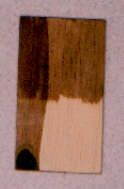
Revised January 2007
Staining Timber
Go to Main Menu
Return to Techniques Index
| There are two types of wood stain: Spirit based and Water based. They both fulfil the same purpose and give identical results but for dolls house furniture the water based is recommended. | |
| When staining the small parts used when making dolls house furniture it is almost impossible to avoid getting stain on your fingers. Rubber gloves can be used for protection but I do not like these as I loose the "feel" of the timber, especially with the very small parts. The problem then with a spirit based stain is the difficulty of removing it from your fingers. The great advantage of water based stain is that it washes off in warm soapy water. |
| 1 - Ensure all parts have been sanded, especially end grain, and wiped clear of dust. | |
| 2 - Shake the stain container and load the brush with stain. | |
| 3 - First stain the edges of the part taking care not to allow any to flow onto the back surface of the wood. This is most easily achieved by using the heel (the ferrule end) of the brush as this hairs at this point are held firmly. | |
| 4 - Place the part on a scrap of wood and stain the top surface. Do not load the brush with too much stain or else excess liquid may spill onto the previously stained edges and darken sections of the wood. | |
| 5 - Allow the stain to fully dry. If both faces are required to be stained, repeat step 4 on the reverse. | |
| Note: To prevent leeching of stain when wet onto the work surface, the front and reverse faces are best stained in separate actions. |
| Thin timber parts that are greater than about 1/2" (12 mm) wide may warp if only one side is treated. With these parts, stain the edges as above but then stain the reverse face. Lay the part treated face down and immediately stain the top face. Possible leeching of the reverse face is preferable to a warped part that may make assembly of the furniture difficult. |

| Stained surface | 
|
| Overlapping stain | 
|
| Slight leeching | 
|
| Unstained timber | 
|
| Excess has run from edge | 
|
© 2007 Neil Helsby